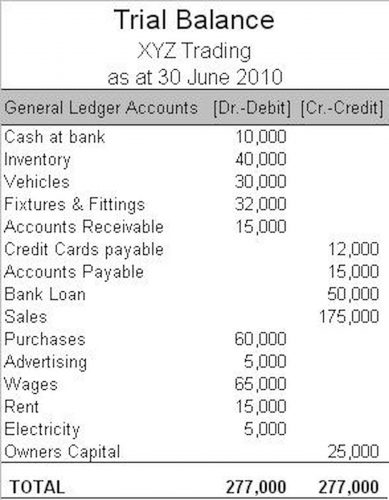Accounting 101: Deferred Revenue and Expenses

Recording the entire $10,000 in the month it’s received will result in an overstatement of net income for that month, with a subsequent understatement of income for the following months. They pay you the full amount at the beginning of the six-month period, and where does deferred revenue go you perform the services over the six months. Deferred revenue can be set to automatically reverse in basic accounting information systems. Though a company will have to monitor the monthly activity, this frees up analysts time to scrub their financial reports.
- This accounting treatment helps in keeping financial reporting accurate, while reflecting the business’s true obligations and commitments to customers.
- As the goods are delivered or services rendered, the deferred revenue balance reduces and the earned revenue portion increases.
- Deferred revenue, also known as unearned revenue, refers to the funds received in advance for products or services that have not yet been provided.
- The entire deferred revenue balance of $1,200 has been gradually booked as revenue on the income statement at the rate of $100 per month by the end of the fiscal year.
- We will use the example of a $1200 subscription spread out across one year.
- Each contract can stipulate different terms, whereby it’s possible that no revenue can be recorded until all of the services or products have been delivered.
Deferred revenue in SaaS
This can happen when a customer pays for a service that has yet to be provided, such as a subscription or membership. In this case, the money received is deferred revenue, meaning it can only be recorded as income once the service is rendered. Likewise, when a company receives payment for goods that have yet to be delivered, the money received is considered deferred revenue. It is important to properly record any revenue and expenses to reflect the business’s financial health accurately. Since deferred revenue represents a liability for the company, it is crucial to keep track of these obligations to ensure proper financial reporting.

Accrual Accounting vs. Cash Basis Accounting
To help you understand how to record deferred revenue in your accounting records, here’s an example of the accounting entries you would make when deferred revenue is received and then reversed. Lastly, https://www.bookstime.com/ it’s important to manage customer expectations when dealing with deferred revenue. Customers who prepay do so with a certain level of trust, expecting timely delivery of the promised goods or services.
Stay up to date on the latest accounting tips and training
When you finally get paid, the accrued revenue is recognized as received revenue. When it is recognized (because your company has delivered), it is proportionally recorded as revenue on your income statement. The adjusting entry to recognize deferred revenue originally recorded as revenue during the period is a debit to revenue and a credit to unearned revenue. Deferred revenue refers to money received in advance for goods or services yet to be delivered. In contrast, deferred expenses refer to expenses paid in advance for goods or services the company has not yet received.

Legal and Regulatory Considerations
When a company accrues deferred revenue, it is because a buyer or customer paid in advance for a good or service that is to be delivered at some future date. Deferred revenue, also known as unearned revenue, refers to the funds received in advance for products or services that have not yet been provided. The term “deferred” signifies that the delivery of these items is postponed. The accounting process involves shifting liabilities to revenue and assets to expenses. Understanding and managing deferred revenue are crucial for a company’s financial health. By accurately accounting for these revenues, businesses can smooth out their income over time, enhance their budgeting processes, and make more informed decisions regarding investments and expenses.
- Therefore, the country club has satisfied one month (1/12th) of its requirement to offer country club benefits for a full year.
- Use of our products and services is governed by our Terms of Use and Privacy Policy.
- The amount customers pay you in advance for your cleaning subscription is the deferred revenue.
- SaaS companies often operate on a subscription-based model, where customers pay a flat fee for access to software applications.
- As deferred revenue indicates an obligation to provide goods or services in the future, it is classified as a liability on the balance sheet until earned.
- The company would have to repay the customer in either case unless other payment terms were explicitly stated in a signed contract.
- Revenue recognition principles define when and how a business’s revenue should be recognized.
- Deferred revenue (also called unearned revenue or income) is a liability owed to a customer for the value of goods or services the customer has paid for but not yet received.
- Bench gives you a dedicated bookkeeper supported by a team of knowledgeable small business experts.
- The amount received for the entire year constitutes deferred revenue, and the company recognizes it as a liability.
- Find the best trucking accounting software for your business with our comparison guide.
- Deferred revenues refer to money received for goods or services to be provided to customers later, whereas deferred expenses refer to money expended for obligations not yet observed.
- A similar term you might see under liabilities on a company’s balance sheet is accrued expenses.
Volatility profiles based on trailing-three-year calculations of the standard deviation of service investment returns. For the past 52 years, Harold Averkamp (CPA, MBA) hasworked as an accounting supervisor, manager, consultant, university instructor, and innovator in teaching accounting online. For the past 52 years, Harold Averkamp (CPA, MBA) has worked as an accounting supervisor, manager, consultant, university instructor, and innovator in teaching accounting online. We’re firm believers in the Golden Rule, which is why editorial opinions are ours alone and have not been previously reviewed, approved, or endorsed by included advertisers.
Unearned revenue and deferred revenue are essentially the same concept in accounting. Both terms refer to advance payments a company receives for products or services that are to be delivered or performed in the future. These payments represent a liability as they reflect the company’s obligation to deliver goods or services to customers at a later date. Deferred revenue, also known as unearned revenue, refers to advance payments a company receives for products or services that are to be delivered or performed in the future. The company that receives the prepayment records the amount as deferred revenue, a liability on its balance sheet.
Advanced Considerations in Deferred Revenue Accounting

